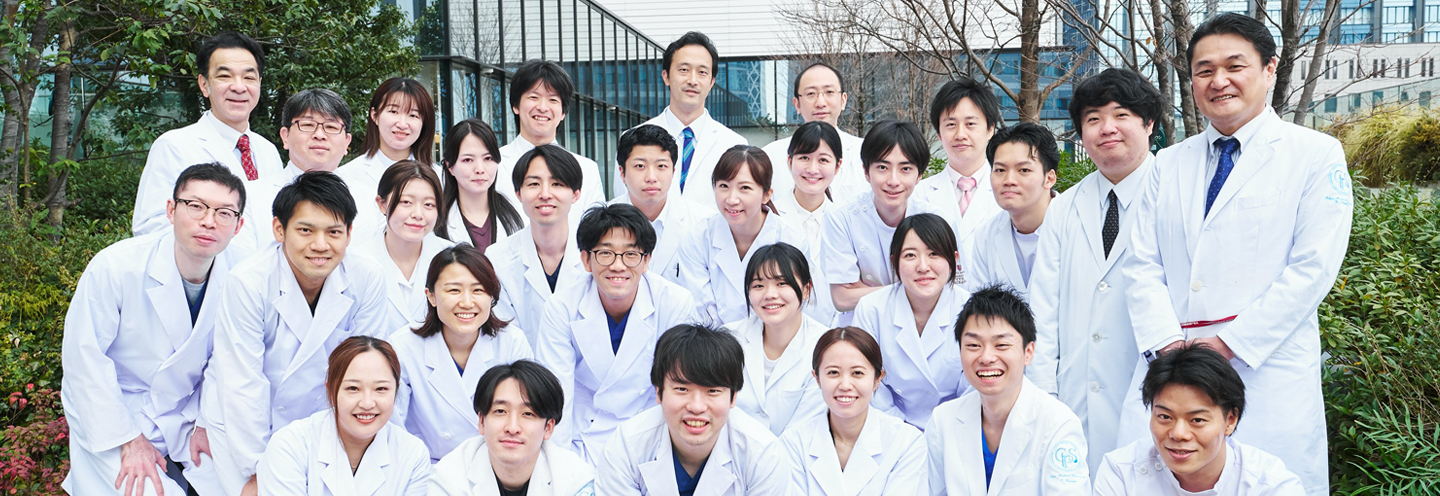
Staff
Staff
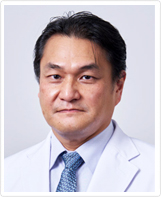
Yuichi Nagakawa, M.D., Ph.D.
Chair and Professor
Vice Director, Tokyo Medical University Hospital
Specialty
Hepatobiliary and pancreatic surgery
Pancreatic cancer treatment
Biliary tract cancer treatment
Liver cancer treatment
Minimally invasive surgery (laparoscopic and robotic surgery)
Biography
Professor Nagakawa graduated from Tokyo Medical University in 1994 and joined the Department of Gastrointestinal and Pediatric Surgery (formerly the Third Department of Surgery). In 2002, he studied at Johns Hopkins University. He was appointed Associate Professor in 2017, Professor in 2021, and Chief Professor in 2022.
He is a highly experienced hepatobiliary and pancreatic surgeon specializing in complex procedures and minimally invasive techniques, including laparoscopic and robotic surgery. He has performed more than 2,000 pancreatic surgeries and has treated numerous advanced cases of pancreatic, biliary, and liver cancers. In particular, he strives to combine surgical expertise with effective multidisciplinary care to maximize the chances of curative treatment.
In addition, he has performed numerous robotic surgeries for pancreatic cancer, biliary cancer, and congenital biliary dilatation. He has also effectively treated challenging conditions such as intrahepatic stones, biliary strictures, and chronic pancreatitis. He places particular emphasis on performing safe surgeries with minimal blood loss, guided by precise anatomical knowledge.
He has held leadership positions in major surgical societies and contributed to the formulation of pancreatic cancer treatment guidelines. He also serves on numerous national and international scientific committees and as Associate Editor for several international peer-reviewed journals. He has been invited to lecture at many international conferences, and surgeons from around the world visit his institution to learn advanced surgical techniques.
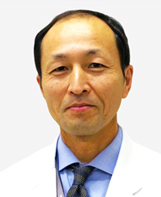
Akishige Kanazawa, M.D., Ph.D.
Associate Professor
Specialty
Hepatobiliary and pancreatic surgery
Liver cancer treatment
Liver transplantation
Minimally invasive surgery (laparoscopic and robotic liver surgery)
Biography
Professor Kanazawa graduated from Osaka City University in 1991 and joined the Department of Hepato-Biliary-Pancreatic Surgery (formerly the Second Department of Surgery). In 2000, he worked at Kyoto University‘s Department of Transplantation Surgery, where he participated in the university’s first living donor liver transplantation. From 2004, he moved to Osaka City General Hospital, where he initiated minimally invasive liver resection. He was appointed Chief of the Department of Hepato-Biliary-Pancreatic Surgery in 2015 and Director of the TQM Center in 2017. In October 2024, he assumed his current position as Associate Professor at Tokyo Medical University.
He has been dedicated to minimally Invasive liver resection for many years, with experience in more than 900 cases. His expertise includes laparoscopic and robot-assisted liver resections for complex conditions such as advanced liver cirrhosis with concomitant liver cancer, refractory intrahepatic cholelithiasis, giant hepatic hemangiomas, and salvage resections. He also has extensive experience in open liver surgery, including liver transplantation, as well as pediatric liver surgery.
Professor. Kanazawa emphasizes safe and precise surgery, achieving favorable outcomes with minimal postoperative complications. He actively collaborates with specialists in gastroenterology and cardiovascular surgery for the treatment of advanced liver cancer to provide curative resections. He has contributed to the development of clinical guidelines for liver cancer treatment and has also worked with medical device companies to develop innovative energy devices that improve the safety of minimally invasive liver surgery.
He has been Invited to give lectures both in Japan and abroad and frequently provides surgical instruction at other institutions, contributing to the dissemination of safe and advanced liver surgery techniques.
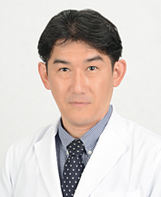
Hiroyuki Koga, M.D., Ph.D.
Associate Professor
Specialty
Pediatric surgery
Pediatric urology
Neonatal surgery
Biliary tract diseases (biliary atresia, congenital biliary dilatation)
Anorectal malformations (Hirschsprung disease, imperforate anus)
Ureteropelvic junction obstruction
Hypospadias
Minimally invasive surgery (laparoscopic, thoracoscopic, and robotic surgery)
Biography
Professor Hiroyuki Koga graduated from Juntendo University in 2000 and joined the Department of Pediatric Surgery at Juntendo University in 2002. He received his Ph.D. in 2006 and subsequently trained in pediatric surgery at the University of Michigan, USA. He was appointed Senior Associate Professor at Juntendo University in 2017, and in 2025 he assumed his current position as Associate Professor at Tokyo Medical University.
Professor Koga has been actively engaged in minimally invasive pediatric surgery, performing a wide range of laparoscopic, thoracoscopic, and robotic procedures. He has accumulated experience in more than 1,000 pediatric minimally invasive and robotic-assisted surgeries. His expertise covers conditions from common pediatric surgical diseases to highly complex cases, including neonatal and biliary tract surgery.
He emphasizes safe, precise, and patient-centered surgical care, ensuring that children and their families receive treatment with compassion and the most advanced surgical techniques available. Professor Koga also contributes to the advancement of pediatric surgery by promoting multidisciplinary care, setting surgical standards, and participating in the development of advanced pediatric surgical programs in Japan.
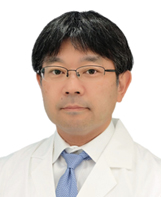
Junya Oguma, M. D., Ph. D.,
Specialty
Minimally invasive esophagectomy (robot-assisted and thoracoscopic esophagectomy)
Esophageal surgery (thoracic esophageal cancer, cervical esophageal cancer, esophagogastric junction cancer, esophageal submucosal tumor, esophageal diverticulum, Boerhaave’s syndrome)
Biography
Professor Oguma graduated from Keio University School of Medicine in 1999 and joined the Department of Surgery at Keio University the same year. In 2008, he trained at Cornell University, USA. He was appointed Associate Professor at Tokai University in 2017, and in 2020 became Chief of Esophageal Surgery at the National Cancer Center Hospital, Tokyo. In July 2025, he assumed his current position as Associate Professor at Tokyo Medical University.
Professor Oguma has long been engaged in minimally invasive surgery and multidisciplinary treatment for esophageal cancer. He has extensive experience with more than 250 esophageal cancer surgeries, including robot-assisted procedures, highly complex resections involving combined organ removal for advanced disease, and surgery for cervical esophageal cancer.
He is also actively involved in clinical research, including prognostic factor analysis in locally advanced esophageal cancer treated with preoperative chemotherapy, and conversion surgery following induction therapy for initially unresectable cases. His work has been presented at academic conferences and published in peer-reviewed journals.
In addition, Professor Oguma engages in international collaboration, particularly with China, where the incidence of esophageal squamous cell carcinoma is highest. He has welcomed international students and delivered lectures and discussions abroad, contributing to the global exchange of expertise in esophageal surgery.
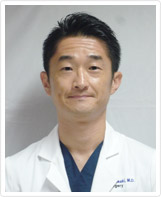
Kenichi Iwasaki, M.D., Ph.D.
Associate Professor
Specialty
Gastric surgery
Upper gastrointestinal surgery
Minimally invasive surgery (laparoscopic and robotic surgery)
Gastric cancer chemotherapy
Gastrointestinal stromal tumors (GIST)
Biography
Professor Iwasaki graduated from Tokyo Medical University in 2006 and completed his surgical residency at Tokyo Metropolitan Komagome Hospital. He joined the Department of Gastrointestinal and Pediatric Surgery (formerly the Third Department of Surgery) at Tokyo Medical University in 2011. He received his Ph.D. in 2016 and subsequently trained at the Department of Surgery, Johns Hopkins University, USA. He was appointed Lecturer in 2019 and has served as Associate Professor since 2024.
Professor Iwasaki specializes in gastric and upper gastrointestinal surgery, with particular expertise in minimally invasive approaches including advanced laparoscopic and robot-assisted techniques. He has been actively involved in the surgical and multidisciplinary treatment of gastric cancer, integrating precise surgical procedures with evidence-based chemotherapy to improve patient outcomes.
He has contributed significantly to the advancement of robot-assisted gastric surgery in Japan, serving as both a certified robotic surgeon and an officially designated proctor for gastric robotic procedures. He also plays a key role in surgical education and training, serving as a certified instructor in several national surgical societies.
Professor Iwasaki is an active member of multiple academic organizations, including the Japanese Gastric Cancer Association and the Japan Surgical Society, where he contributes in leadership capacities. Internationally, he is a member of the Society for Surgery of the Alimentary Tract (SSAT) and a Fellow of the American College of Surgeons (FACS).
Through his research, academic presentations, and collaborative activities, he continues to contribute to the development of minimally invasive gastric surgery and gastric cancer treatment both in Japan and abroad.
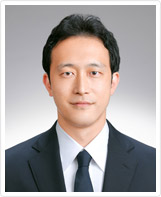
Junichi Mazaki, M.D., Ph.D.
Associate professor
Specialty
Colorectal surgery
Colorectal cancer treatment
Minimally invasive surgery (laparoscopic and robotic surgery)
Biography
Professor Mazaki graduated from Tokyo Medical University in 2007 and completed surgical training at the National Hospital Organization Tokyo Medical Center and the Disaster Medical Center. In 2015, he joined the Department of Colorectal Surgery at the National Cancer Center Hospital, Tokyo, where he completed a fellowship in 2016. He received his Ph.D. in 2022 and, in 2025, was appointed Associate Professor at Tokyo Medical University.
Professor Mazaki specializes in minimally invasive and robotic colorectal surgery and has been engaged in a wide range of procedures, from standard resections to highly complex cases. He has actively adopted robotic surgery since its early implementation in Japan and continues to advance minimally invasive approaches for colorectal cancer. His surgical philosophy emphasizes curative treatment whenever possible, combining precise surgery with perioperative chemotherapy and multidisciplinary care, always guided by a spirit of persistence.
He also places great Importance on preserving urinary and bowel function and pursuing organ-preserving strategies whenever feasible. Even in challenging cases such as locally advanced unresectable colorectal cancer or colorectal cancer with distant metastases, he aims to provide treatment with curative intent through comprehensive multidisciplinary approaches.
Professor Mazaki has presented his work at numerous academic conferences, published in peer-reviewed journals, and received awards for his contributions to colorectal surgery. He continues to promote advanced surgical techniques and his treatment philosophy through academic lectures and seminars in Japan and abroad.
